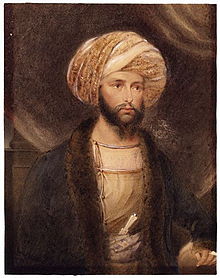Sir James Abbott (James Abbott)

He joined the Bengal Artillery at the age of sixteen. He made a name for himself in the northwest frontier region of India in the middle part of the 19th century. In 1839, he undertook a mission to the Khanate of Khiva as part of the Great Game, the contest for influence in Central Asia between the United Kingdom and the Russian Empire. His objective was to obtain the release of Russian slaves in the Khanate to deny the Russians a pretext for invading it. Abbott was probably the first Briton to reach Khiva. The Khivans knew little of the British Empire and suspected him of being a Russian spy. He was welcomed however because they thought he might be able to do something about the impending Russian invasion. When the invasion was called off Abbott was sent west to the Russian post at Fort Alexandrovsk. On his way he was captured by raiders, but was released when they learned that he was carrying letters from the Emir. Shortly afterwards Richmond Shakespear was successful in the same task. He was one of Sir Henry Lawrence’s Young Men, ‘advisers’ to the Sikhs, after the First Sikh War (1846)., who did sterling work in pacifying the Frontier and Northern Punjab and he was later to remain the first Deputy Commissioner of Hazara (1849–1853).
As part of the terms of the Treaty of Lahore signed after the defeat of the Sikhs in the First Sikh War, Hazara and Kashmir were to be transferred to Raja Gulab Singh, Dogra; Hazara, however, proved an intractable charge and was returned to the Lahore government by Gulab Singh in January 1847, in exchange for Jammu. Thereafter, the Lahore government appointed Sardar Chatar Singh as ‘Nazim’ (Administrator) for Hazara and deputed Abbott along with him as his assistant to try to restore law and order and make an ‘honest assessment’of the revenues of the area and he did a very good job of it. Subsequently, after the Second Sikh War of 1848-49, when the Punjab was formally annexed by the Honourable East India Company (HEIC), this area also came under its writ and Abbott was duly appointed as its first Deputy Commissioner. Abbott’s original seat of government in the Hazara was at Haripur but he eventually decided to shift this up into the hills for climatic and strategic reasons. Thus, a site was selected and acquired in late 1852, and Abbott thereafter shifted his headquarters there in January 1853, founding a small town and military cantonment which was to grow over time. Unfortunately, Abbott himself could not long witness the growth of his town,as he was posted away from this charge in April 1853. Abbott died in the Isle of Wight in 1896, preceded by his wife Anna Matilda Abbott (1839–1870).
Born
- March, 12, 1807
- Kent, England
Died
- October, 06, 1896
- Isle of Wight, England
Cemetery
- Guildford Cemetery
- Surrey, England


